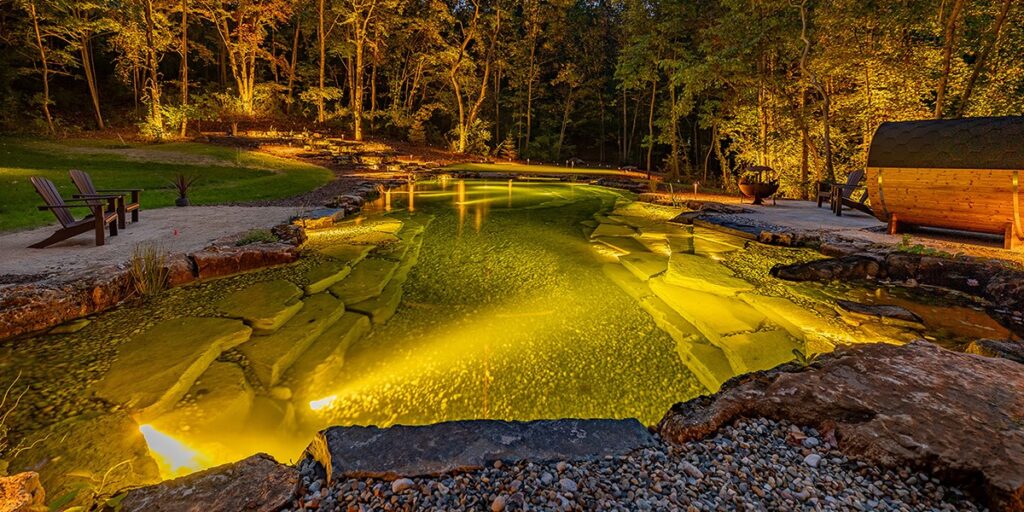
Budding crocuses, longer days and the pond ice melting, yes, pleas. These all are signs that spring is upon us. As your pondkeepers come out of hibernation, it is important that they receive good advice from you, their water gardening expert. They will have many questions as to what steps they should take to ensure a long and prosperous pond season. For many, this will last eight to nine months. Therefore, take time now to educate your customers. It is not only important to your pondkeepers but it will also ensure you have a profitable year.
Pond Prep
Explain to your pondkeepers that their first step should be to examine their pond for damage. This includes punctures or tears in the lining that will need to be patched. They should also start cleaning the pond of accumulated debris. Spring is also the time to discuss with them about their long-term pond goals. If they’ve been considering expanding their pond, now is a good time, especially if they have to replace the lining or rearrange stones around the pond. Spring is the perfect time to add a waterfall and a header pond. Both are excellent for the pond and fish. Besides increasing the oxygen level and helping water quality, waterfalls add a wonderful aesthetic element to the pond.
Now is also a great time to plan the addition of floating, submerged and potted plants to the pond. Explain the unique characteristics of aquatic plants and the benefits they add to the pond. In addition to adding valuable nutrients and oxygen to the water, they also provide shade and shelter for fish.
Equipment Clean Up
Pondkeepers in colder climates may have had to add a de-icer this winter. Instruct these customers to remove the de-icer, dry it and store it properly for easy set-up next fall. Next, explain to your pondkeepers to inspect all hoses. It is important to replace any hose or fitting that has a leak now, rather than wait for the pond season to be in full swing. Lastly, have your customers’ start their pond pump and filter, in shallow water, to ensure it is working properly.
Water and Fish Care
Spring is a critical time of the year for fish. As they come out of dormancy, their bodies are low on important nutrients that help ward off disease. Therefore, they are more likely to become vulnerable to illness. To keep the incidence of sickness to a minimum, it is important to clean out sludge and debris from the bottom of the pond. At the start of the pond season, recommend your pondkeepers replace up to 25% of the pond water with tap water. Remind them to add a water conditioner to remove chlorine, chloramines and heavy metals found in most tap water.
Explain to your pondkeepers the importance of treating water early in the season and regularly thereafter. Walk through the importance of healthy water with your pondkeepers, and remind them that healthy water means a healthy ecosystem especially if they plan on adding fish. This can be confusing for your customers so be sure you fully understand the ins and outs of water care. Walking them through a visual representation of the nitrogen cycle can be very helpful.
Educate your customers on what a healthy fish looks like and what signs a struggling fish exhibits. Fish that are sick will be gasping for air, have a change in color or emaciated appearance or show visible sores and spots. In spring, to make the transition from dormancy to an active state pond fish should be fed a wheat-germ based diet only after pond water temperatures rise above 39°F. Don’t forget to display food, water conditioners and water treatments at eye level so your customers can easily find what they are looking for.
In-store Spring Prep
While you will soon be busy educating and helping your customers prepare for spring, don’t forget your own in-store display and spring prep. Whether you have a large pond department or just a few shelves, determine what needs to be re-stocked and cleaned up. Be sure to create displays that will engage your pondkeepers. Remember that colorful posters and live water displays will excite your customers. Even if you have only a small space, consider a container water garden display, which is always sure to inspire!
Remember, you are the expert and your customers look to you for advice and good judgment. If you are able, offer to test your customers’ pond water for proper levels. It is a great way to get to know their pond and will give you the opportunity to recommend appropriate water treatments that are right for their pond needs. Adding these value-added services to your pondkeepers will build trust and customers for life!

